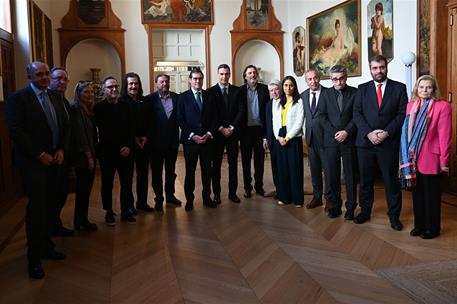Pedro Sánchez stresses that culture is "a strategic sector for Spain" and guarantees support for its digital transition
President's News - 2024.2.28
Images of the event | Pool Moncloa/Jorge Villar - 2024.2.28
Ateneo, Madrid
Pedro Sánchez has defended that, "despite what some people proclaim out of ignorance or the most rancid prejudices, culture is not a subsidised sector", but a "strategic sector for Spain" and an "engine of prosperity that more than pays back what it receives from the institutions".
He said this during his participation in inaugurating the conference 'Cultural and creative industries: A rising value with immediate challenges', organised at the Ateneo de Madrid by the Spanish Confederation of Business Organisations (CEOE) and the Association for the Development of Intellectual Property (Adepi).
The president highlighted the "power" of the Spanish cultural industry, which is "increasingly becoming a true global benchmark for creativity and talent", and the "strategic" nature of a sector that employs 700,000 people in Spain and represents 3.3% of GDP, with an "absolutely decisive impact on the unprecedented achievements of other key sectors of our economy, such as tourism". In fact, last year saw a "historic" increase in employment in the audiovisual sector, which shows that "the sector has overcome the harsh impact of the pandemic".
"We have the professionalism, talent and specialisation of the sector's workers; the largest fibre optic network in Europe in which the fruits of creativity circulate and the unique asset of our language, Spanish, a language spoken by more than 600 million people around the world", he emphasised, before going on to refer to the challenges facing the sector.
Copyright and Related Rights Office and development of the Artist's Statute
Faced with the challenge of the "unstoppable" development of artificial intelligence, Pedro Sánchez has advocated a response in which respect for copyright always prevails in order to protect creators and cultural producers. In keeping with this commitment, the Council of Ministers yesterday approved the the draft law on the Copyright and Related Rights Office (Oficina de Derechos de Autor y Conexos), a body demanded by the sector, which will be key to protecting intellectual property in the face of the challenge of technology.
The head of the Executive has also assured that progress will continue to be made in the development of the Artists' Statute, a milestone of the last legislature on which the Government is working for its total development and with which, for the first time, a temporary artistic employment contract has been created, which is adapted to the needs and specificities of the sector.
Language PERTE and 'Spain Audiovisual Hub'.
Pedro Sánchez has guaranteed support for the sector in the face of challenges such as the transition to digital models. In this respect, he explained that with the PERTE of the New Economy of the Language which envisages an investment of more than 1.1 billion euros and which will mobilise a further 1 billion euros in private investment, will boost growth and international competitiveness in sectors such as science, research, audiovisual production, cultural dissemination, learning, translation and artificial intelligence.
The Government's "strategic vision" and "long-standing commitment" to cultural industries and activities related to intellectual property also includes the Spain Audiovisual Hub initiative, with 1.6 billion euros allocated and aimed at making Spain a leading country in audiovisual production. Since 2018, the Government has more than doubled the volume of resources allocated to culture, with more aid for cinema and pioneering lines of support, such as the Youth Cultural Voucher.
The President of the Government of Spain highlighted the fact that cultural industries "broaden life" with new experiences - as was particularly the case during the pandemic - and contribute to "articulating and building material well-being in our societies". "We have an obligation to protect this valuable ecosystem, and rest assured that we will do so. This is our commitment", he concluded.
Non official translation





